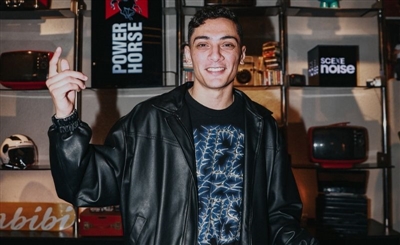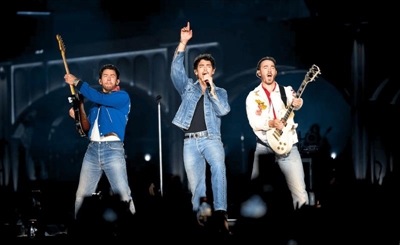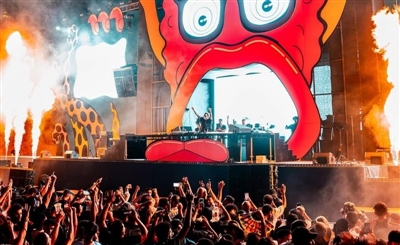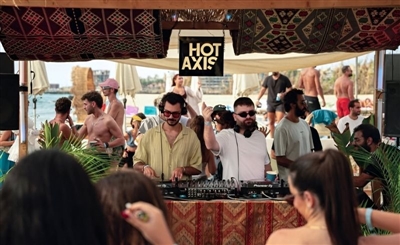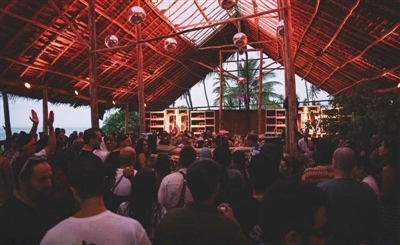Algerian Artist Idriss D Drops New Album ‘Bled el fen’
Idriss D speaks to SceneNoise on his new album, ‘Bled el fen’, and the launch of his label, NEDJMA Records.

Renowned producer and DJ Idriss D, known for his eclectic sets and diverse musical influences, has dropped his latest album, ‘Bled el fen’, celebrating his Algerian heritage. The album arrives alongside the launch of his new label, NEDJMA (‘Star’ in Arabic), which Idriss created to champion music and talent within the MENA region, particularly underrepresented artists "who lack a platform to release their own productions," as he puts it.
Idriss' achievement on this album goes beyond typical Eastern and Western fusions. He delves into the rhythmic core of electronic and techno music, weaving in Arabic influences through carefully selected samples. This creates a unique bridge between the two styles, avoiding any sense of forced hybridity.
Idriss D introduces the album's theme on the first track, ‘Tsakhbira’. Ethereal, drone-like synths build a sense of intrigue and mystery, immediately immersing the listener. A haunting, Eastern string melody captures our attention, leading into the vocals of Zineddine Bouchaala, who delivers a captivating mawwal (folk song). The intro serves as a powerful promise, hinting at the captivating sonic exploration to come.
This atmosphere continues in the subsequent title track, ‘Bled el fen’. It follows the same vein with traditional oud passages, layered by interspersed synth stabs and eerie atmos. Throughout the record, we encounter bouncy rhythm sections that create a cohesive sonic identity for the album. This identity is further emphasised by Idriss's intricate and selective use of synthesisers, and the traditional and oriental samples and instruments he incorporates.
In this exclusive interview with SceneNoise, Idriss D tells us about the creative process for the album and what he hopes to accomplish musically and culturally.
How did the musical environment of your upbringing shape and influence your artistic expression?
Thank you for talking to me about this album. It’s been a big project for me. I grew up surrounded by musicians and traditional singers in Algeria. Most of my uncles from my mum’s side of the family were and still are musicians, as well as managing music schools in the region. I still have visions of my uncle playing music and keeping the tempo in check with his leg.
Throughout your career, how has your musical style evolved and transformed?
I started playing funk and soul music in the late 90s. African American music influences my own musical direction, as well as having my own rec shop in the early 2000s. Having your own shop gives you the opportunity to hear and discover more music and genres, especially the more experimental side of electronica.
What was the creative vision that inspired the inception of ‘Bled el fen’?
I have been working for years with an idea for an album that was somehow related and pays tribute to my home country. My origins are in electronic music, so a new label to host this album seemed fitting and the right move, as it might not really fit my current label Memento, or any other label out there. It’s different, and that's what I love about it. I want to support and give a voice to some of the amazingly talented artists that I have come across from the Arabic music scene, and this seemed the best way to collaborate with them on tracks for ‘Bled el fen’. Our goal is not to just release a sound, but to also make it workable for dancefloors and more. In crafting the album, what cultural and artistic aspirations do you aim to fulfill?
In crafting the album, what cultural and artistic aspirations do you aim to fulfill?
To make the Arabic community proud of their own talent and hope to create curiosity with my existing fan base with this release. It’s going to be a new sound for them, but I hope that people embrace the sound and its ethos. Hopefully it will enable people to dive a little deeper into our culture in a musical way. Your music seamlessly blends traditional Eastern melodies with Western instrumentation.
What ignited this innovative fusion?
Algeria is a big country with many influences, and I started with the Malouf style. Having a maestro like Zinedine Bouchaala on the album was just amazing, and he brought this style in force. We also have rai modern by artists like Chazil. The track featuring Leila Moon is more psychedelic, and Gasba Electrique takes a traditional element, along with Bendir. The blend of East and West was necessary to help integrate this music into the scene we have today. To make something which is not playable at clubs and parties, seemed a strange concept to me, so the mixture of the two makes a better and I think, perfect balance.
How do you select and integrate samples into your compositions? Could you elaborate on your favourite samples used in the album?
Honestly, besides a few samples, which have been played and recorded live, I got the rest in Algeria, a few local musicians but also using hardware too. The darbouka (or percussions) are used in nearly all of the tracks on the album. What emotions or atmospheres did you intend to evoke through the sonic landscape of your album? I want to touch the hearts of the listeners with a positive sound. I didn't want to create melancholic or sad emotions from the music on the release. Even though some of the messages might be strong and emotive, they bring up feelings of passion and unity. The goal was to really keep an electronica vibe, also with some more downtempo tracks.
Can you elaborate on your process for selecting and incorporating diverse sonic elements into your music? What do you aim to convey through this eclectic fusion?
The goal was to elaborate my roots in a sound direction. This meant minimal, trippy and everything in between, along with the white noise effects. For anyone who knows my previous works, they will recognise the mood, even in new voices or music coming from another culture. An album has a beginning and an end, it's a journey of growing slowly and an introduction into each track step by step. I take up the BPM as the journey continues. I can imagine people driving for an hour and listening to this album, avoiding skipping tracks, and listening to each in the way they were designed.
In your creative process, do you prioritise rhythm, melody, or find both equally significant?
When building an album all ideas are important, as all the tracks are connected, whether it be a voice, a pad, a synth, or the drums. So, there is no formula as to what’s prioritised, whatever comes first, you work on that and around it as the track progresses.
At what point did you start experimenting with music production, and how has that journey influenced your sound?
I made some of my first music in around 2007, a remix first and then a track on my own Memento Records. I have always been a fan of minimalism and was curious as to how to produce a track with so little elements yet without it being boring. How to keep people dancing with such minimal music was really so interesting to me, and that's how it started. Reflecting on your performances in Western venues, how do audiences respond to the cultural and musical roots embedded in your music?
How to keep people dancing with such minimal music was really so interesting to me, and that's how it started. Reflecting on your performances in Western venues, how do audiences respond to the cultural and musical roots embedded in your music?
Before this album, I prepared my audience to hear the unusual stuff, not just Arabic tracks. I always have played Omar Souleyman or Khalid’s music, and sometimes people don't get it, and they have said some things when giving feedback, but most like things different and unexpected, so I will stay true to what I love and want to play.
How do collaborations with other artists contribute to realising your artistic vision?
In the past, the only collaborations that I had were remixes, whether I was remixing them or vice versa. I have never really been a fan of doing collab tracks, but for the album I wanted to share the ideas and important aspects of each of the producer’s sounds. They are a huge part of this album and label, as without them we would not have been able to create awareness for what they do.
What inspired the establishment of your label NEDJMA, and what impact do you envision it having on the music scene in the MENA region?
Music in our culture represents all the moments experienced – weddings, a new job, Ramadan, Eid, a new birth. Therefore, it makes the music varied and emotive. I hope that this kind of sound can make an impact on what people know about dance music, even if that impact is small. The platforms available to these talented artists are limited, so I created NEDJMA to open the doors into a new world and expose their talent and culture. This isn’t a business, it's a passion project and something that means a great deal to me.
How does NDJEMA differ from your existing label Memento, and what unique contributions does it bring to the music industry?
NEDJMA and Memento are very different. NEDJMA as mentioned has been created to support and help grow awareness and music from a culture that doesn't have a voice. We’re supporting new talent and also introducing music that's not really available or yet affiliated with the dance music scene. Memento is my long standing label since 2016 that focused on being an experimental electronic label, which has had some special releases, remixes and more from some big artists. They are both very special in their own way.
What forthcoming plans or releases can we anticipate from NDJEMA?
After the album, we plan to release more music, but at the moment we are spending a lot of time listening and digging for music. We can expect more music from Gasba Electrique, who always delivers when it comes to solid music. I am also waiting for new material from an artist called Diaz and a few others.
Could you describe your workflow when crafting a track or album, from inception to completion?
Being a DJ and someone who buys a lot of vinyls, I get inspired by so many different sounds. With vinyl I feel you don't skip the track, you really listen and hear more. It’s how music should be listened to. The creativity is always drawn from this, as well as playing, travelling and experiences in life and the emotion you take from each. First I always build on that initial idea, the melody and its elements. With my track ‘Lunatic’, both versions 1 and 2, the drums were not the first thing I did, they came later. So yeah, it can vary. There is no secret method.
Who are some of your most significant musical influences, and how do they manifest in your work? (Do we hear a Muslimgauze influence?)
For this album in particular, my inspiration was from what I was listening to when I was a child in Algeria, and the soundtracks I heard in Egyptian movies. I always kept this with me, waiting to be able to do something with it, and now the time felt right. I felt like I needed to grow a fanbase with my other music first before I introduced this different work. Zinnedine Bouchala is an Algerian artist and underground star who never wanted to release anything, so having him on the album with the collaboration track was such a seemingly unreachable dream that has come true.
How do you integrate elements of Algerian and Arabic music into your compositions, and what significance do they hold for you?
I made a feature with my uncle Lamine in my previous album, it's an acoustic track and that worked really well. In the other, I was the voice of Feirouz which I integrated into a track, which was more of a club-oriented sound. I just try to treat all of the elements with as much respect as I can without changing it totally, and to allow its vibe and mood flow into the track. I also need to have the work approved by my community, not to just create something for my fans or myself.
What are your future aspirations and plans for your musical journey?
Honestly, future studio plans are on standby for now because I had an EP on Memento with ‘Lunatic 2’, and then I had to work on this album. That was years of work, so now it’s all promo off the back of that and I am exhausted! For now, I am just digging to deliver great DJ sets and then when the winter comes I’ll start thinking about the release plans for myself and Memento for 2025.
What are your insights on the current state of the music industry in the MENA region, and what potential developments do you foresee?
Not that I see developments, or can really say what is to come, as that's hard. But as I mentioned before we have incredible talent, great music which is heavily influenced by the culture that many places do not have, which creates a different energy to the music. But there just needs to be more visibility in the world for it, especially in the electronic scene. I hope that we can all do things to help those less able to have a voice shine through in some or any way possible.  As a DJ, could you share some of your experiences and insights into the art of live performance?
As a DJ, could you share some of your experiences and insights into the art of live performance?
I remember in the middle of a set at the legendary Cocorico in Italy, which holds about 5,000 people, I played a track from Omar Souleyman, which was a risk for sure. I remember a guy making a sign, “Idris, are you f***ing crazy?” but with a big smile on his face. I then jumped into the crowd, so I could say that they’re open to new things. Don't misunderstand me when I say that we all need to discover other stuff, but I think we do. I take my work seriously and dedicate a lot of time to digging for new music, whether it be something that people are used to me playing, or something a bit out there. Finding a way to make people still dance to music they have never heard and with a strange element to it, for me is something I want to continue doing.
How would you define your unique sonic identity as an artist?
Experimental. Are there any particular artists you're excited to collaborate with on future projects, and why? My icon is Carl Craig and hope one day to have the honour to work on a track together or have a remix from him.
Trending This Month
-
Jan 29, 2026



